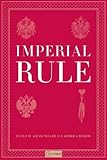Imperial Rule / ed. by Alfred J. Rieber, Alexei Miller.
Material type: TextPublisher: Budapest ; New York : Central European University Press, [2022]Copyright date: ©2004Description: 1 online resource (218 p.)Content type:
TextPublisher: Budapest ; New York : Central European University Press, [2022]Copyright date: ©2004Description: 1 online resource (218 p.)Content type: - 9786155211140
- Imperialism -- History -- 19th century
- Imperialism -- History -- 19th century
- Impérialisme -- Histoire -- 19e siècle
- Nationalism -- History -- 19th century -- Russia
- Nationalism -- Russia -- History -- 19th century
- Nationalisme -- Histoire -- 19e siècle -- Russie
- HISTORY / Russia & the Former Soviet Union
- Empires, Habsburg Empire, Nation-state, Nationalism, Ottoman Empire, Russian Empire
- 325/.32/09034 22
- JC359 .I67 2004
- online - DeGruyter
| Item type | Current library | Call number | URL | Status | Notes | Barcode | |
|---|---|---|---|---|---|---|---|
 eBook
eBook
|
Biblioteca "Angelicum" Pont. Univ. S.Tommaso d'Aquino Nuvola online | online - DeGruyter (Browse shelf(Opens below)) | Online access | Not for loan (Accesso limitato) | Accesso per gli utenti autorizzati / Access for authorized users | (dgr)9786155211140 |
Frontmatter -- Contents -- Introduction: Imperial Rule -- 1. NATIONALISM AND IMPERIAL RULE -- The Empire and the Nation in the Imagination of Russian Nationalism -- The Russians and the Turks: Imperialism and Nationalism in the Era of Empires -- Imperial instead of National History: Positioning Modern German History on the Map of European Empires -- 2. LEGITIMACY AND IMPERIAL RULE -- Justifying Political Power in 19th Century Europe: The Habsburg Monarchy and Beyond -- Schism Once Removed: Sects, State Authority, and Meanings of Religious Toleration in Imperial Russia -- Redefining Identities in the Late Ottoman Empire: Policies of Conversion and Apostasy -- 3. CORE AND PERIPHERY -- Empire on Europe’s Periphery: Russian and Western Comparisons -- The Spanish Empire and its End: a Comparative View in Nineteenth and Twentieth Century Europe -- The Russian-American Company as a Colonial Contractor for the Russian Empire -- The Comparative Ecology of Complex Frontiers -- List of Contributors -- Index
restricted access online access with authorization star
http://purl.org/coar/access_right/c_16ec
Renowned academics compare major features of imperial rule in the 19th century, reflecting a significant shift away from nationalism and toward empires in the studies of state building. The book responds to the current interest in multi-unit formations, such as the European Union and the expanded outreach of the United States. National historical narratives have systematically marginalized imperial dimensions, yet empires play an important role. This book examines the methods discerned in the creation of the Habsburg Monarchy, the Ottoman Empire, the Hohenzollern rule and Imperial Russia. It inspects the respective imperial elites in these empires, and it details the role of nations, religions and ideologies in the legitimacy of empire building, bringing the Spanish Empire into the analysis. The final part of the book focuses on modern empires, such as the German "Reich." The essays suggest that empires were more adaptive and resilient to change than is commonly thought.
Mode of access: Internet via World Wide Web.
In English.
Description based on online resource; title from PDF title page (publisher's Web site, viewed 29. Jul 2022)


